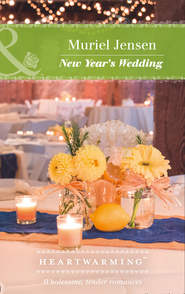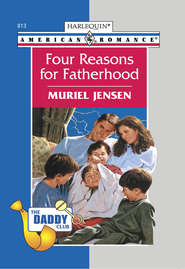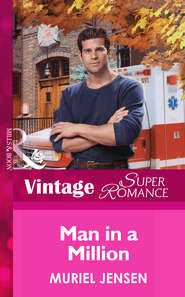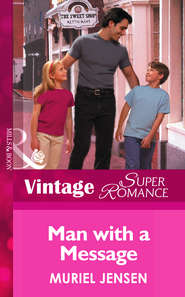По всем вопросам обращайтесь на: info@litportal.ru
(©) 2003-2024.
✖
The Man She Married
Автор
Год написания книги
2019
Настройки чтения
Размер шрифта
Высота строк
Поля
“Ohhh,” Evan said as though that clarified things. Gideon was confused.
But not about what he knew. Hank and Evan backed away from him, each at an angle, then came toward him. Hank was easily dispensed with, but Evan had had some training. Gideon struggled with him for a moment, then finally overbalanced him, hooked his left leg and used the weight of his own body to drive Evan’s shoulders to the floor. Gideon leaped up again, ready for a counterattack.
Hank and Evan, both supine, looked at one another.
“What do you think?” Hank asked him.
Evan, breathless from their brief but fierce struggle, nodded. “Yes. But if you tell anybody he took both of us, I’ll hurt you!” He frowned at the children. “And that goes for you guys, too.”
The children giggled, obviously not taking him seriously.
Gideon offered his hand to Evan and hauled him to his feet. Then both reached for Hank.
“Am I still invited for dinner?” Gideon teased.
“Absolutely,” Hank replied. “I want to talk to you about a job.”
CHAPTER THREE
“THE FISHING LODGE caught fire, or something, yesterday,” Camille said, handing Prue a bag of oranges. She put two bags of lettuce into the vegetable crisper in the fridge, then closed the door and looked into Prue’s dismayed face. “I met him at the market. He was supposed to leave for Boston this morning, then fly out to Alaska, but his partner asked him to wait until the lodge is rebuilt. Hank offered him a job, so he’s staying here until the lodge is ready.”
Prue was stopped in her tracks by that news. No. That couldn’t be. She had fifty-one special orders for her designs. She couldn’t operate under that kind of pressure with the possibility hanging over her of running into Gideon at the market or the Barn.
“Tell me you’re kidding,” Prue pleaded.
Camille pushed a ten-pound bag of potatoes into her arms. “Can’t do that. It’s the truth. Put that stuff away before you get a hernia.”
Prue carried the oranges and potatoes to the far corner of the room where an old-fashioned cooler-cupboard opened to the outside and kept produce cool. She placed the food on the slatted shelf, then closed the door and came back to her mother.
“But why would he want to stay here? I’m here. We’re getting a divorce.”
“Divorced couples often live in the same city.”
“This isn’t a city, this is a small town! We’ll keep bumping into each other.”
Camille smiled as she walked past her with a dozen eggs destined for the refrigerator. “Then you’ll have to behave with grace and dignity when that happens, won’t you?”
Prue sank dispiritedly onto a stool pulled up to the work island in the bright cream-colored kitchen. “I don’t think I’m capable of that,” she grumbled.
Camille, on her way back to the grocery bags, stopped to stare at her. “What?”
“Come on, Mom,” she said, playing with the bag of green onions sitting on the countertop, waiting to be washed. “You know how it is. Paris has the smarts, and I have the…the reputation for reacting. She keeps her cool, and I just try to look pretty while I’m preparing to blow up or laugh nervously.”
Her mother changed directions and came to sit on the stool beside her. “What are you talking about? You’ve always been the…the…”
“Princess…” Prue provided for her. “Yes, I know. The one who likes things her way, who forces the issue until it comes out her way. To some people, it looks like charming determination, but to those who know me well, it just means I don’t know what to do when things don’t turn out the way I planned. Because Paris is the brains and I’m like you.”
Camille blinked, obviously uncertain whether or not to be insulted. “Thank you, Prudence,” she said drily.
Prue touched her arm. “Mom, you know what I mean. Paris is a woman of today, all intelligence and quick wit. Who else could come home with nothing and make a taxi service a going concern?”
“You’ve opened what appears to be a very successful design studio,” Camille pointed out.
Prue shrugged. “I can see designs in my head and I can sew. But my talents are the kind that would have gotten me through if this was nineteenth-century France. But this is twenty-first-century America where women run countries and corporations, fly in space, preside over colleges and hospitals. I’m out of date.”
Camille blinked again. “Then, if you’re just like I am…”
“No.” Prue anticipated her conclusion and denied it. “You’re not out of date. You’re an actress and a model. You’re supposed to look beautiful and be fabulous and charm everyone.” She met her mother’s eyes. “And we know how brave you’ve been. I’ve proved nothing, except that I can sew.”
Camille put a hand to Prue’s cheek. “Prudie, when did this insecurity begin? I don’t remember you ever questioning yourself this way.”
“I’ve had a lot to think about since I’ve come home.” She took her mother’s hand and held it. “I’ve watched Paris take hard news and still get on with it. I’ve learned about all you went through that we never suspected. And you both found men to love who loved you in return.”
Camille squeezed her hand and said significantly, “So did you.”
“But I apparently wasn’t enough.”
“Depends on what you choose to believe.”
Prue covered her eyes with one hand. “Let’s not have that argument again.” She dropped her hand to the table and said with a touch of regret, “My plan was to finish my orders, then maybe take my designs to New York where I can really compete. But if Gideon’s staying here, maybe I’ll go to New York now.”
“Well, that’s foolish,” Camille said. “You have fifty-one orders. Doesn’t that involve fittings—probably more than one—for each garment?”
Prue had to concede that it did. She knew she couldn’t leave, it just felt good to pretend that she could.
“Yes, it does. It’s going to take me months.”
“You told me last night that Rosie DeMarco said she could help you in her spare time.”
Prue nodded. “It’s going to take months even with help.”
“Then, you’ll just have to decide that when you run into Gideon, you’ll be civil and not make a scene.”
“I think you should make a scene.” Paris walked into the kitchen holding a large bowl covered with plastic wrap. “I think the next time you see him, you should run into his arms, tell him you want to listen to his explanation one more time with an open mind, and try your marriage again.”
Prue rolled her eyes at her sister. “You’re delusional. What’s in the bowl?”
“Chilly’s chili,” Paris replied, handing the bowl to Camille. “I had lunch with Randy at the station and—you know his partner on the ambulance, Chilly Childress—sent me home with leftovers. You have to try this stuff. It’s hellfire ambrosia.” She took Camille’s stool as her mother put the bowl in the refrigerator. “Did you know,” she asked Prue, “that Gideon’s rented that old A-frame on the far side of the lake? He’s staying for a while. Something happened with the partnership deal. Addy told me. I guess Hank found him the house.”
“A fire happened,” Prue informed her. “Mom met Gideon at the market this morning.”
“So, what do you think?” Paris asked, looking pleased. “I think it’s fate. I think the cosmos is conspiring to force the two of you together so you have to work it out.”
Prue caught her mother’s eye across the work is land as she prepared a pot of coffee. “And to think I said Paris was the smart one.”
Paris broke into a wide smile. “She did?” she asked Camille. “Prue said I was smart?” She turned to her sister in suspicion. “You want something. What is it? A kidney?”
Prue swatted her arm and slipped off the stool. “I have to get to the studio. You just keep dreaming.”











